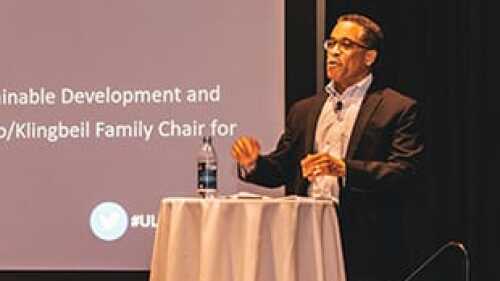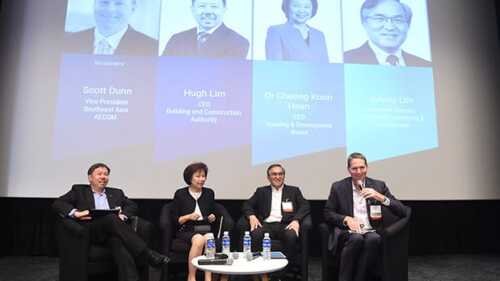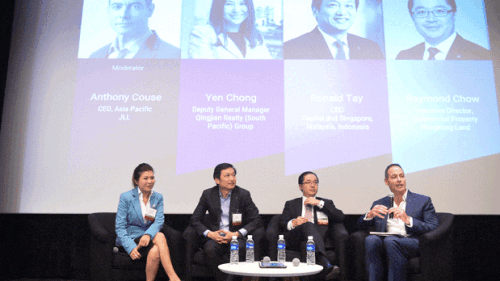Economy, Market & Trends
Nashville is evolving from “a nice small city to an emerging, medium-sized city,” said speakers at the 2019 ULI Spring Meeting, in part because of the city’s willingness to invest in its downtown through public-private partnerships.
Civic leaders, including public officials and private developers, must be proactive and prepared to take risks if they want to develop their cities for the new economy, ULI Senior Fellow Tom Murphy said at the ULI Spring Meeting in Nashville. Cities are facing unprecedented changes in a variety of arenas, including cultural, technological, economic, and demographic. At a session titled “Smart Choices in a Changing World,” ULI’s senior fellows debated ways that cities can thrive in a new economy while creating a sustainable workforce for future needs.
While the construction industry is a significant contributor to economic growth in Singapore and the region, it has been plagued by low productivity and insufficient investment in innovation over the years. A panel discussion at a ULI Singapore conference brought together expert speakers from the public and private sectors to touch on some of the new technologies—ranging from prefabricated construction methods to 3-D modeling systems—that are being used by industry players, and what more needs to be done to encourage wider adoption of these solutions.
When the Octopus card was introduced to Hong Kong 22 years ago, it quietly revolutionized transportation in the city. It certainly made the city “smarter” and easier to navigate, both quicker and with a lot less spare change in your pocket. But what steps can a city such as Hong Kong take now to ensure it remains relevant in another two decades’ time?
Hong Kong has beaten its own record to post the worst affordability ratio in the history of the annual rankings produced by urban demographic analysis website Demographia. It now costs 21 times the median annual income to buy an average-priced Hong Kong home, 40 percent higher than Vancouver and Sydney, which are the next worse off. Panelists discussed the solutions being offered by both the public and private sectors at a ULI Hong Kong event in March.
Like other business sectors, innovative technology is having a disruptive impact on building construction, operations, and management, according to speakers at a ULI San Diego/Tijuana event in March, who discussed new technology used to cut time for project due diligence; make cost estimates accurate and construction more precise; improve building operations and efficiency; and enhance tenant engagement, comfort, and satisfaction.
Property developers and owners are accelerating the pace of adoption of new technology, introducing new solutions to enhance the customer and tenant experience and to improve operational efficiency. A discussion at the ULI Singapore Annual Conference in February brought together senior executives from leading regional players to discuss their experiences with implementing technology in their organizations.
While the Dallas/Fort Worth (DFW) region has been highly successful in drawing corporate relocations to the area, city leaders, speaking at a ULI North Texas event, said that the main weakness in Amazon’s eye for the e-commerce giant’s second headquarters (HQ2) was an insufficient amount of existing and available talent.
At the recent ULI Europe Conference in London, Michael Gove, the current Secretary of State for Environment, Food and Rural Affairs for the U.K., and Lord Adair Turner, chair of both the Energy Transitions Commission and the Institute for New Economic Thinking, discussed how inclusive and sustainable economic growth can be achieved while also addressing issues of climate change and wage inequality.
Though real estate experts keep worrying about a possible recession, the U.S. economy continues to perform well, and the prospects for real estate investment are still strong, panelists said at a ULI New York event in Manhattan during January.





